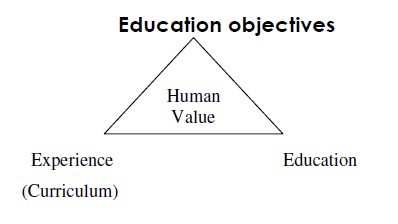SKEDSOFT
Human Education:
Over the past decades since the inception of our modern school and collegiate system, educators, parents and students have realized there is an area of insufficiency in the system we have instituted. Although academic subjects may be thoughtfully planned and courses have been structured for the maximal suitability and benefit of our youth for career purposes, the topic of personal behavior and attitudes has not been given due importance or emphasis in the educational curriculum. The assumption has been that children imbibe all the values and ethics they need from their home lives, and that it is not the purview of the educational system to discuss these at all, especially since it was felt that such discussion may lead us into controversies among various communities. However, as a nation we now realize the error in this assumption and there is widespread recognition of the need to talk about values in our educational system as they pertain to every sphere of life. We can all acknowledge that there is no need to worry about cultural sensitivities or controversy if the most basic values are taught to our youth, as there are many values, which are admitted to be universal. Certain community or culturally based values may be relative, but there are attitudes and behaviors based in universal values that unquestionably contribute to the health, happiness and wealth of each person and the society as a whole.The evidence is all round us that the lack of such education results in selfishness and an uncaring attitude toward one’s fellowmen; at worst it results in violence, exploitation and utter disregard for life that no society can afford or it will forfeit its prosperity and peace, and be liable to descend into anarchy or fascism. Our wonderful country, simultaneously blessed and burdened with its extreme density of population and diversity of communal and religious sentiments, can only survive with a majority that is mentally and physically healthy, tolerant and liberal in outlook, as only such citizens will be able to care for and work for the prosperity of all.
Aims of Education:
All round development of individuals is possible through education. Among it intellectual, mental and functional development is expected. Though cognitive and conative domains are developed through today’s educational system, affective domain cannot receive its proper place. That is the reason for paucity of national attitude, and social consciousness among students. If moral, social and spiritual values are exchanged through the media of subject content, emotional development will easily be possible. Following are the chief aims of education:
1. Knowledge
2. Understanding
3. Application
4. Skill
5. Interest and aptitude
6. Appreciation
7. Inculcation of human values
NEP 1986 prepared value based curriculum. It also made clear and fixed particular values along with objectives while teaching particular units.

The purpose of Virtuous Life:
The question is why should we strive for a virtuous life. What is it that makes life virtuous? ‘Virtue is knowledge’ was the principle of Socrates. All knowledge should end in virtuous living was his interpretation. Knowledge without virtue is meaningless. Our forefathers focused their attention in leading a virtuous life. According toSocrates (470-399 B.C), greatest good of mankind lies in the virtues like courage, friendship, love and so on. Aristotle (384-322 B.C.) was the disciple of Plato. He said, “We strive for goodness of the things surrounded by us. What is important is not to live long but to live well.”
Concept of Value:
Though meaning of value is originally related to economic value, philosophes like, Rudaullah lotse, Albrace Richel in nineteenth century attached more extensive meaning to value. It is in this broad sense, we today, use the term value as ‘Literary value,’ ‘Democratic Value’, ‘Life Value’ and ‘Education value in our day to day speaking and writing. In life process man accepts good things and avoids bad things. It is not human living to act neutrally and in the light of witness only. Acceptable and non-acceptable, good and bad are the nature of values. Values are established and they are practicable. They can be achieved. Chilana (1987) studied Indian culture and observed that Indian culture is based on the values, viz, kind heartedness, self control, universal brotherhood, honesty, respect to others and faith. Due to deterioration of these values, new values like indiscipline and destructive mentality came into existence. He suggested to include these values in curriculum and called it value-based curriculum.